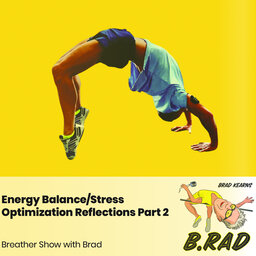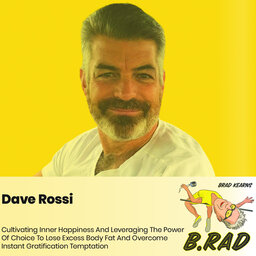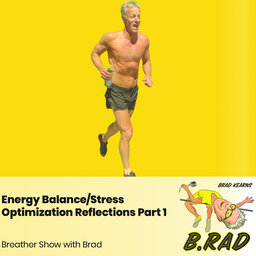Fitness Strategies For Anti-Aging, Part 1 (Breather Episode with Brad)
Hi listeners! Here comes a great show about fitness suggestions for anti-aging—the critical objective to age gracefully rather than follow in line into the accelerate-decline-suffering-and demise pattern that we see all around us, thinking it’s a part of chronological aging or that it’s normal.
In fact, it’s absolutely not normal—I love the quote from ageless wonder/Paleo forefather Dr. Art DeVany, who says “aging is essentially damage caused by adverse lifestyle practices.” Of course we’re going to have a lifespan somewhat characterized by decline as the decades pass, but we can recalibrate our notions of what that looks like, and one way to do so is to look at the outliers who are making magnificent athletic feats, even at older ages. A lot of the time we discount or dismiss those examples as being genetic freaks, failing to recognize how important those lifestyle behaviors are to 1) make the most of your genetics and 2) minimize genetic misfortunes—you can go a long way towards negating or even nullifying these things completely through healthy lifestyle practices—including a bunch of fitness stuff we’re going to talk about today.
Who knows, maybe one day we can dream of following in the footsteps of 100-year-old Lester Wright, who recently ran the 100m in 26 seconds at the age of 100! Just try running 100m in 26 seconds the next time you’re at your local running track—it’s not super fast, but it’s not slow either—what an amazing accomplishment! You’ll hear about the protective benefits of having muscle mass throughout your life and honing and maintaining skills like balance, Dr. Peter Attia’s goal of training for the centenarian Olympics, how to kick butt in your 80s, how I plan on celebrating my 95th birthday, and the reasoning behind Mark Sisson’s goal to “live long and drop dead.” I also talk about the correlation between physical fitness and cognitive fitness (including facts from a great UCLA study I often reference), our human genetic obligation to move and how walking leads to having a larger hippocampus, and how prolonged sitting generates chronic inflammation in the body and sitting for as little as 20 minutes generates a noticeable decline in glucose tolerance and an increase in insulin resistance—meaning you get worse at burning fat, while you’re starting to crave sugar and lose cognitive function—all from sitting around for a seemingly brief period of time. We’ll be hitting some more advanced fitness objectives during this show, such as exercises to perform to maintain muscle mass throughout life, and touch on Robb Wolf’s advice that if you want to live longer, lifting more weights and eating more protein is the way to go. I also talk about how as we age, we become less efficient with protein synthesis (hence the importance for increasing protein intake), how simply going to the gym once a week to do five compound movements is enough to generate increases in muscle strength, and why you don’t want to mix skill development with aspirations to build strength, as this can lead to workouts that overly stressful and will promote breakdown and regressions in your progress. Finally, we discuss the importance of minimizing stress while pursuing maximum fitness benefits and the importance of being careful not to stack assorted stressors (fasting, low-carb, restrictive diets) with intense exercise and the difference between environmental and plant hormesis.
TIMESTAMPS:
It is not normal to fall apart as you age! Aging is essentially damage caused by adverse lifestyle practices. [01:24]
Brad plans to go for the high jump record when he is 95 years old! [04:33]
Walking is so important. A UCLA study showed those who walked over 4,000 steps a day had larger brains. They were sharper, more cognitive, and better functioning. [07:10]
We have an increasing need for protein as we age. [08:58]
Just going to the gym once a week is enough to generate increases in muscle strength. [11:47]
Maintaining muscle mass is most important for anti-aging goals. [15:01]
Aerobic conditioning is essential but it will come in all manner of fitness activities. [20:34]
Resistance exercises focus on full body movements. [26:40]
Micro workouts are always doable and help in preventing falls. [33:33]
Muscles help us control our glucose levels. They use glucose as fuel and have a role in insulin resistance. [39:46]
It’s never too late. Sarcopenia is the decline of skeletal muscle tissue which can be rebuilt. [43:36]
You get the most profound adaptations for body composition and anti-aging hormones when you participate in high intensity, sprinting, and jumping. [46:15]
It is difficult to combine endurance training with the other disparate skills, like sprinting. Learn to sprint properly. [53:57]
LINKS:
- Brad Kearns.com
- Brad’s Shopping page
- Lester Wright 100m
- Dr. Howard Luks Podcast
- Dr. Peter Attia
- Dr. Herman Pontzer Podcast (Energy Expenditure)
- Jay Feldman Podcast
- Body by Science
- OsteoStrong
- Podcast with Dr. Craig Marker
- Podcast with Dr. Casey Means
- Podcast with Dr. Paul Saladino
- Jogging 2.0 YouTube
- Dr. Howard Luks
- Podcast with Chris Hinshaw
QUOTES:
- "If you want to live longer, lift more weights and eat more protein." (Wolf)
Join Brad for more fun on:
Instagram: @bradkearns1
Facebook: @bradkearnsjumphigh
Twitter: @bradleykearns
YouTube: @BradKearns
TikTok: @bradkearns
-
We appreciate all feedback, and questions for Q&A shows, emailed to podcast@bradventures.com. If you have a moment, please share an episode you like with a quick text message, or leave a review on your podcast app. Thank you!
Check out each of these companies because they are absolutely awesome or they wouldn’t occupy this revered space. Seriously, Brad won’t promote anything he doesn’t absolutely love and use in daily life.
- Brad’s Macadamia Masterpiece: Mind-blowing, life-changing nut butter blend
- Male Optimization Formula with Organs (MOFO): Optimize testosterone naturally with 100% grassfed animal organ supplement
- BeautyCounter: Complete line of cosmetics tested to be free of typical toxins and endocrine disruptors. Try Brad's favorite vitamin-C skin serum and make the switch away from toxic mainstream skin-care products!
- Butcher Box: Convenient, affordable home delivery - free shipping! - of the highest quality meat, poultry, and seafood with customizable box design. Click here for special promotion.
- Bala Enzyme: Electrolyte and triple enzyme recovery drink mix. BRAD30 for 30% off
- BiOptimizers: Top quality performance supplements like magnesium, probiotics, and digestive enzymes. BRAD10 for 10% off
- Paleo Valley: Nutrient-rich, ancestral inspired health products. BRAD15 for 15% off
- BradNutrition.com: Coming soon - the ultimate whey protein superfuel formula for peak performance and longevity
- Ultimate Morning Routine Online Course: Learn how to custom-design an energizing, focusing morning exercise routine. Enroll now for earlybird discount
Check out Brad Kearns Favorites Page for great products and discounts
In 1 playlist(s)
The B.rad Podcast
Brad Kearns covers health, fitness, peak performance, personal growth, relationships, happiness, and…Social links
Follow podcast
Recent clips

Energy Balance/Stress Optimization Reflections, Part 2: Correcting Misconceptions About Calorie Balance, Fat Loss, And Longevity (Breather Episode with Brad)
1:01:02

Dave Rossi: Cultivating Inner Happiness And Leveraging The Power Of Choice To Lose Excess Body Fat And Overcome Instant Gratification Temptation
1:14:01

Energy Balance/Stress Optimization Reflections, Part 1: Could Popular Hormetic Stressors Like Fasting And Intense Exercise Be Too Stressful? (And Could Calling Out Liver King Draw In More Listeners? (Breather Episode with Brad)
35:34
 The B.rad Podcast
The B.rad Podcast